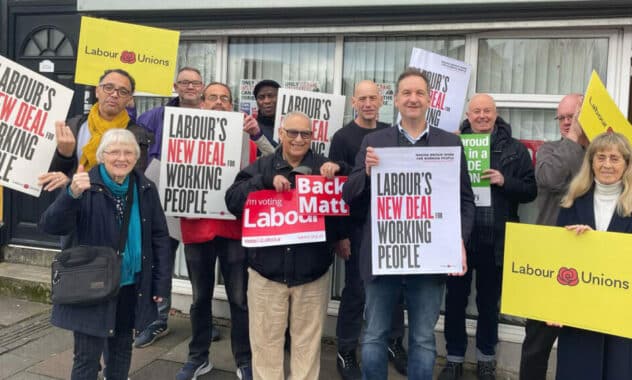Lord Mandelson stirs up a hornet’s nest on workers’ rights
Former Blair advisor's intervention on the New Deal for Working People met with strong rebuke

Lord Mandelson has added his voice to business concerns over Labour’s New Deal for Working People. Writing in the Sunday Times, the former New Labour advisor argued that proposals must not be ‘rushed’ and there is a need to reassure investors about “red tape”. In the piece, entitled ‘Labour’s union reforms must not be rushed. They can’t betray business’, Lord Mandelson warned that “businesses and investors will have eyes on the total UK business environment, including regulation”:
“There is a clear case for reform but the case needs to be tested, priorities established and the complexities addressed.
This must not be rushed but it must be done in consultation with business. Reeves said last week that in moving the legal pendulum back on trade union laws to the centre, it will not go further than the settlement bequeathed by New Labour.
Employers need to be satisfied before the election that this will be honoured in both the spirit and detail of the proposed law.”
He added that shadow chancellor Rachel Reeves had said that “in moving the legal pendulum back on trade union laws to the centre, it will not go further than the settlement bequeathed by New Labour.”
Reeves had said in her Mais Lecture to the City of London:
“On trade union legislation, we will reverse changes since 2010 that have done nothing to prevent the worst period of disruption since the 1980s, but instead have contributed to a conflictual, scorched-earth approach that has stood in the way of productive negotiation.
These policies didn’t exist under Blair and Brown when there were fewer strikes and less disruption. We will work with business as we deliver and implement these policies.”
Mandelson did get some support for his comments from Tory MPs – Business Minister Kevin Hollinrake posted on Twitter / X that Labour’s plans would mean ‘a lot fewer businesses’:
“[I] totally get the view some will take that when times have been tough it’s time for a change, but it’s worth reflecting on why it is that the Labour Party has always left office with UK unemployment higher than when they entered it. Day 1 employment rights would mean that businesses would have to use a 4 stage process (then potentially an employment tribunal) if someone didn’t work out or even turn up for work; an end to Zero Hours Contracts; enhanced rights for Trades Unions inc collective bargaining would lead to strikes and huge public sector wage settlements; their previously stated policy (not yet reconfirmed) of a £15 National Living Wage would devastate businesses and jobs in sectors such as hospitality, retail and social care.”
However, both Labour politicians and trade union leaders reacted strongly to the intervention, reasserting the importance of Labour’s package of rights and the need for a radical shake up after years of wage stagnation and attacks on trade union freedoms.
Shadow Minister for Employment Rights, Justin Madders said:
“We have had well over a decade of wages lagging behind the cost of living, growing insecurity at work and a rise in exploitative jobs. The case for reform so that we have well paid, secure, trade union recognised jobs is as strong as it has ever been.”
Labour opposition figures were careful to insist that an incoming Labour government would consult with business leaders in implementing their reforms. Party Chair Anneliese Dodds said:
“We’re a pro-worker and pro-business party. We need to ensure that work pays. That’s the motivation for Labour’s New Deal for Working People. The measures in that New Deal would actually increase productivity. They would put more money in workers pockets and they’d also boost the conditions for innovation as well.
Of course, those proposals will be delivered in a way that’s in the interests of business as well as in the interests of workers.”
Trade union leaders were less sanguine about Mandelson’s contribution to the debate.
Unite general secretary Sharon Graham said:
“Peter Mandelson earns his corn working as a consultant for private corporations.
His constant attacks on workers’ rights seem to be driven by his personal financial interests as well as his outdated desire to see Labour reduced to a 1990’s neoliberal tribute act.
Throughout the cost-of-living crisis, where profiteers have been allowed to run amok, only trade union bargaining power has defended the living standards of working people.
And only a resurgence in collective bargaining across all sectors, will ensure that the economic pie is better divided and that ordinary workers get the pay rise they deserve.”
TUC General Secretary Paul Nowak said, on X:
“Wages no higher in real terms than they were in 2008. Insecure, low paid work hard wired into the economy. Household debt spiralling. Good employers undercut by zero hours cowboys. Spare me the ‘unintended consequences’ of decent employment laws brigade and their outriders.”
On the Today programme on Monday, he added:
“I don’t think it’s a good look for peers of the realm, or indeed company chief executives to be telling low paid workers, people on insecure contracts, just wait and there might be a little bit of justice coming down the line.”
National Education Union general secretary Daniel Kebede said the article showed “the new deal will only be delivered if unions and their members fight for it.
“Waiting for milk and honey will deliver no milk or honey.”
Scottish TUC leader Roz Foyer, said the Labour Party must “stick to their word” in their commitment to working people, who “deserve nothing less after 14 years of attacks from this failed and rotten Tory Government”.
“The comments from the haunting spectre that is Lord Mandelson fly in the face of the promises given to our movement on the importance of the New Deal.”







